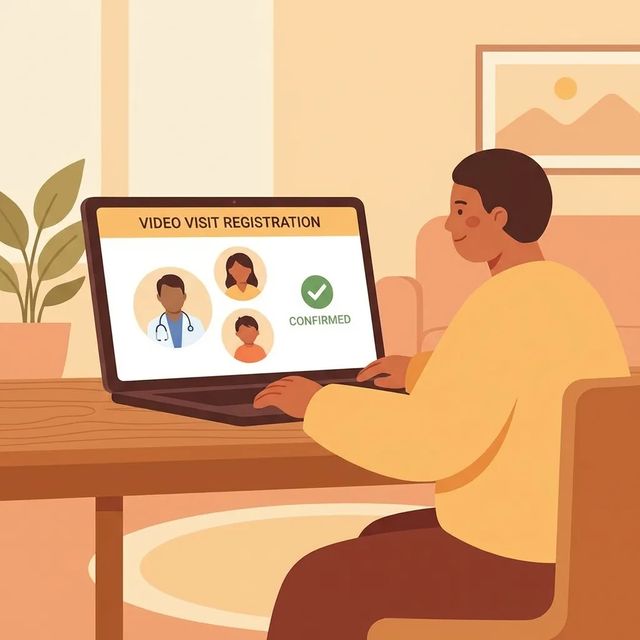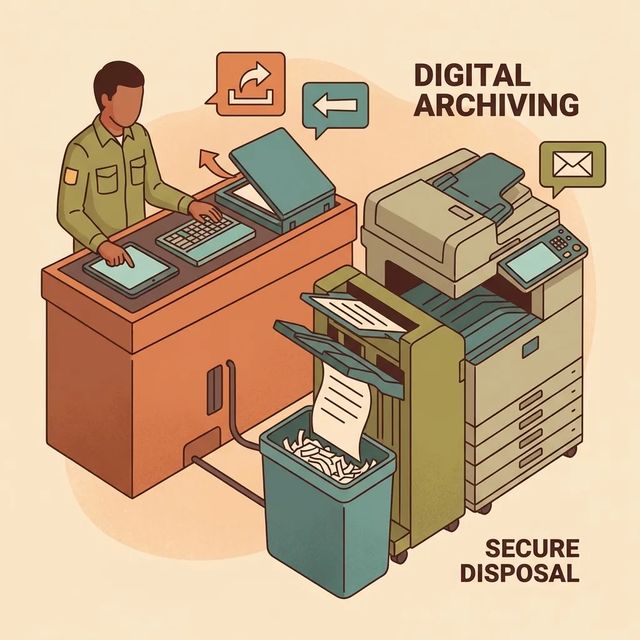Heritage Trails Correctional Facility
Explore
Find an Inmate at Heritage Trails Correctional Facility
Search for a loved one and send messages and photos in minutes.

Guides for This Facility

Before Your First Visit to Heritage Trails: Required Documents & ID Checklist
Getting approved and having your ID ready makes your first visit go smoothly. Here's how to complete the ViaPath application without delays.
Read Guide
How to Register for Video Visits at Heritage Trails: Step-by-step ViaPath & Scheduling Guide
Setting up video visits feels like a lot the first time—accounts, approvals, scheduling windows. Here's a clear path to get registered and ready to visit at Heritage Trails.
Read Guide
Mail and Packages to Heritage Trails: Why Letters Are Copied, Amazon Rules, and Restricted Correspondence
Mail rules at Heritage Trails feel strict, especially the first time you send something. But once you know what gets copied, what gets rejected, and when you need special permission, avoiding delays is straightforward.
Read GuideAt a Glance
Visitation
- All visitors must register for a ViaPath account and be approved before scheduling visits.
- Scheduling on the ViaPath visitation platform is shown in Eastern Time.
- Visitors age 16 and older must provide an accepted photo ID and will undergo criminal background and warrant checks.
Communication
- Visitors must register and schedule video visits at www.gtlvisitme.com.
- Incarcerated people must complete a telephone list with no more than 20 names/numbers.
- Available call types include collect, prepaid/AdvancePay, and inmate PIN-debit minutes.
Mail & Letters
- General correspondence is copied in black & white and originals are not given to incarcerated individuals.
- Copied general correspondence must be distributed within forty-eight (48) hours.
- Incoming general correspondence is kept on-site for at least fourteen (14) days.
Sending Money
- You can add money by phone using AdvancePay (800-483-8314), PIN Debit (855-706-2445), or Trust Fund (888-988-4768).
- Make money orders payable to ViaPath Financial Services; payments are forwarded to the Indiana Department of Correction.
- A completed deposit form must accompany any mailed money order and must be included with the payment.
Facility Info
- Command 5.0 tablets issued at Heritage Trails include two headphone jacks and magnetic charging.
- The first pair of headphones for each tablet is provided free; additional or replacement headphones must be purchased from the commissary.
- Tablets remain state property and incarcerated individuals are responsible for intentional loss or damage.
Based on official sources and community feedback. Learn how we verify
Topic Overviews
Visitation
Everything starts with ViaPath. Create an account and get approved before you can schedule any visit—in-person or online. Applications use State Form 14387 and go through facility staff. When booking, double-check the time: ViaPath displays schedules in Eastern Time. Visitors 16 and older need an accepted photo ID and will go through criminal background and warrant checks. Active warrants get reviewed by facility investigators, and local law enforcement is notified as appropriate. Be accurate on your application—falsifying information gets you banned from all correctional facilities for one year. Trafficking contraband? That gets referred to Indiana State Police with prosecution recommended, and can mean a permanent ban. For video visits, sign in 15 minutes early. For on-site video, arrive 15 minutes early with valid photo ID and follow dress standards: shirts or blouses, appropriate bottoms and undergarments, no hats unless for religious reasons.
Read full guideCommunication
Heritage Trails Correctional Facility uses third-party vendors for remote communication. For video visits, create a vendor account and schedule your appointment at www.gtlvisitme.com before the visit. Phone service works through collect calls, prepaid/AdvancePay, or inmate PIN-debit minutes (typically purchased through commissary). The incarcerated person must submit an approved telephone list with up to 20 names and numbers before making outgoing calls. Heads up: collect calls won't connect to cell phones, office lines, or hospital numbers. You can fund prepaid calling by setting up AdvancePay or buying minutes through ConnectNetwork or vendor portals. Vendor toll-free lines handle payments and support. Need to block or unblock a number? Use ViaPath customer service tools and prompts.
Read full guideMail & Letters
Sending mail to Heritage Trails? Expect a copy-based process. The mail room copies incoming general correspondence in black and white—originals aren't given to incarcerated individuals. Pictures and videograms must follow printed-matter requirements and the facility's offender correspondence rules. Copies get distributed within 48 hours, and incoming mail is kept on-site for at least 14 days. Staff inspect mail for contraband and refuse prohibited items like cash, stickers, or sexually explicit material. Many facilities now scan mail and deliver it electronically rather than providing originals. If correspondence is delayed, censored, or withheld, the incarcerated person gets notified within two working days using State Form 11984, which includes the reason and grievance information.
Read full guideSending Money
Adding money for someone at Heritage Trails? You've got a few options. Call AdvancePay at 800-483-8314, PIN Debit at 855-706-2445, or the Trust Fund line at 888-988-4768. Prefer to mail a money order? Make it payable to ViaPath Financial Services—the facility forwards these payments to the Indiana Department of Correction. Include a completed deposit form with any mailed money order, and don't include staples, paper clips, stamps, cash, letters, photos, or other items. Whichever method you choose, have the incarcerated person's name and required ID details ready.
Read full guideCommon Questions
Showing 6 of 15Will Heritage Trails run background or warrant checks on visitation applicants?
Yes. Criminal background and warrant checks are conducted for all applicants age 16 and older. Active warrants are reviewed by facility investigators, and local law enforcement is notified as appropriate.
VisitationWhat happens if I falsify my visitation application for Heritage Trails?
Falsifying a visitation application results in a one-year ban from all correctional facilities.
VisitationDo I need to register on ViaPath before scheduling a visit at Heritage Trails?
Yes. You must register for a ViaPath account and be approved before you can schedule in-person or online visits. The application uses State Form 14387 and is processed by facility staff.
VisitationHow do I register and schedule a video visit at Heritage Trails?
Register by creating an account and scheduling your video visit at www.gtlvisitme.com. If there’s a fee, scheduling accepts debit cards, charge cards, and Visa/Mastercard gift cards.
CommunicationWhat are the phone call options and how do I add funds for calls at Heritage Trails?
Calls can be collect, prepaid/AdvancePay, or placed using inmate PIN-debit minutes purchased from commissary. To add funds by phone, use these toll-free options: AdvancePay 800-483-8314, PIN Debit 855-706-2445, Trust Fund 888-988-4768. You can also buy minutes through ConnectNetwork.com or the vendor portal.
CommunicationHow can I block or unblock incoming calls to someone at Heritage Trails?
You can refuse an incoming call by hanging up or pressing “1,” and pressing “6” can permanently block the calling number after you set a 4-digit PIN. To remove a block, call ViaPath customer service at 877-650-4249; removal typically takes 1–2 business days.
CommunicationMore Guides
Ready to Connect?
Search for your loved one to start communicating today
Did You Know?
**Note:** You must register for a ViaPath account and be approved before scheduling in-person or online visits at Heritage Trails Correctional Facility.
This guide is based on feedback from dozens of families and official facility documentation. Learn how we verify
